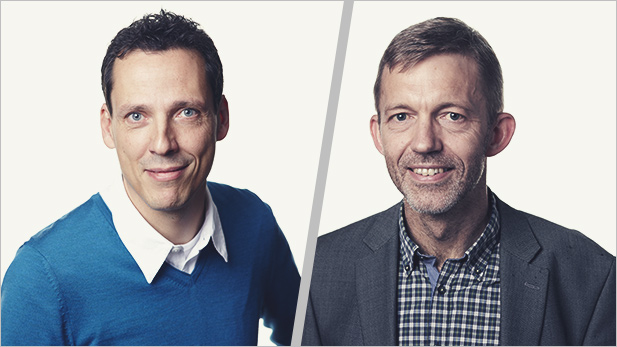Novo Nordisk Fonden giver 20 mio. til CBS-forskning

Photo: Bjarke MacCarthy og CBS
To the left Anders Sørensen and to the right Hans Christian Kongsted
Do the skills of university graduates improve because they were taught by researchers? What effect does university research have on innovation in private companies? Two wide-scale innovative research projects at CBS will attempt to address these key issues. The recipient of 10 million Danish kroner each, the projects will begin in 2017 and last four years.
The two principal investigators expect empirical data from the research to provide a more solid foundation for the political debate on education and research in Denmark.
- We have a theory that university cutbacks mean lower quality, in other words, that fewer people get a degree and that graduates are of a poorer quality. There are multiple opinions concerning the effect of cutbacks, but we don’t actually know what the factual consequences are, explains Professor Anders Sørensen from the Department of Economics, who heads the research project “The socio-economic importance of research-based education”.
This project will also clarify what the implications are for value creation when an employee is a university graduate or, for example, a business college graduate.
- Does it make a difference that university graduates come from an environment where the teaching is done by researchers? Do university graduates contribute more to the innovation taking place in companies, or can they be replaced by employees from programmes that are not as research-based, asks Sørensen.
The other research project, “Investments, incentives and the impact of Danish research”, is headed by Professor H.C. Kongsted from the Department of Innovation and Organizational Economics and will thoroughly investigate good business ideas and the effect academic research has on them.
- We want to understand how universities, companies and researchers interact, how they jointly produce knowledge and innovation and what the socio-economic effects of research are, states Kongsted. This project takes a closer look at, for instance, the effect of university researchers on the number of patents in the biotech industry, which is a growth leader in the Danish context.
- In that project we’ve chosen to examine measureable factors such as patents, but we also measure academic results on their own terms: How much do researchers produce? What type of publications do they produce and how many citations are there? We also take a broader view of what researchers can contribute, for instance, with consulting or by changing jobs to work in the private sector. The goal is to describe the interactions occurring between companies, universities, and organisations that fund research in order to understand how they affect the individual researcher’s activities, explains Kongsted, continuing:
- As a society we would like research to be published and put into use. Not all research seems immediately useful. Should the aim be, for example, to work more with strategically targeted programmes or to have more basic research? That’s a political discussion on research that we’d like to help qualify. It requires solid knowledge about the socio-economic impact of research based on detailed data concerning actual conditions.
Read more about Novo Nordisk Foundation
Read bout H.C. Kongsted
Read about Anders Sørensen